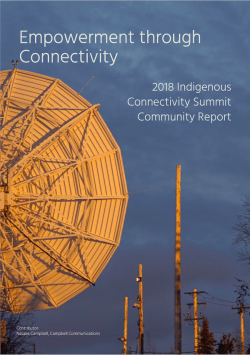Executive Summary
The 2018 Indigenous Connectivity Summit (ICS) was held in Inuvik, Northwest Territories (NT) on October 11 to 12, 2018 to find solutions to ensure Indigenous communities across North America can connect to fast, affordable, and reliable Internet. It drew nearly 140 delegates to Canada’s Arctic Circle (and included more than 700 virtual participants) for a two-day series of panels and presentations themed on connecting the first1 1,000 miles with a focus on rural and remote northern communities. The event was preceded by a one-day training session at the University of Alberta in Edmonton for Indigenous people currently operating a community network or seeking to deploy one.
Speakers and participants identified significant challenges to connectivity in rural and remote northern communities. These include geographic barriers, diverse socio-economic realities, growing bandwidth requirements, and lack of research. Community networks2 were widely recognized as an ideal solution to enable many rural and remote northern communities to connect themselves to the Internet on their own terms.
The event also explored how connectivity empowers northern Indigenous communities. Participants identified the Internet as a powerful tool to support language and culture revitalization, health
and education outcomes, and economic development and self-determination. To further amplify Indigenous voices in the future of the Internet, participants developed the following principles:
- Consultation: It is critical to consult with Indigenous communities and stakeholders to develop meaningful, relevant, and culturally appropriate connectivity solutions.
- Advocacy: Indigenous communities must take steps to amplify their voices to have a say in the decisions that shape the future of the Internet.
- Capacity building: Indigenous communities would benefit from education opportunities, including culturally-appropriate digital literacy resources, technical training, and financial management to support sustainable connectivity solutions.
- Strategic partnerships: Indigenous communities can benefit from strategic partnerships with influential individuals, organizations, anchor institutions, and others who share common values and connectivity goals.
Participants also developed recommendations for a national broadband strategy, which will be submitted to the Canadian federal government.
Videos of the presentations and discussion are available on the Internet Society’s livestream channel at https://livestream.com/Internetsociety/indigenet2018.
What is the Indigenous Connectivity Summit?
Indigenous communities throughout Canada and the United States face unique challenges to Internet access and inclusion. The Internet Society began the annual Indigenous Connectivity Summit so that a diverse community of stakeholders could develop solutions to ensure Indigenous communities can connect themselves to fast, affordable, and sustainable Internet.
The inaugural event held in Santa Fe, New Mexico in November 2017 started an important conversation about what connectivity means to Indigenous communities and how to ensure Alaska Native, American Indian, Inuit, First Nations, and Métis communities can get up to speed. The 2017 Indigenous Connectivity Summit Community Report highlighted a vital correlation between connectivity and various socio-economic benefits. It also found community networks are an ideal path for many Indigenous communities to drive their own connectivity solutions.
The 2018 Indigenous Connectivity Summit was held in Inuvik, Northwest Territories from October 11 to 12, 2018 to continue the conversation sparked by the initial event. It hosted about 140 Indigenous community network operators, Internet service providers, policy-makers, and Indigenous leadership in a series of panels and presentations themed around connecting the first 1,000 miles. Over 700 people viewed the event online.
The event examined unique challenges and opportunities in rural and remote northern Indigenous communities and showcased success stories of community networks around the globe to inspire solutions to close the digital divide. An additional theme emerged at this year’s event which focused on empowerment and ways to ensure Indigenous voices have a say in the future of the Internet.
The 2018 Indigenous Connectivity Summit was presented by the Internet Society, in partnership with the University of Alberta, First Mile Connectivity Consortium, the Town of Inuvik, and Inuvialuit Regional Corporation. The event was sponsored by the Canadian Internet Registration Authority, the Internet Corporation for Assigned Names and Numbers, Google, CANARIE, OneWeb, Cybera, Telesat, and Iristel. Wally Schumann, the Government of Northwest Territories’ Minister of Industry, Tourism and Investment and Minister of Infrastructure provided a welcome address on behalf of the territory.
